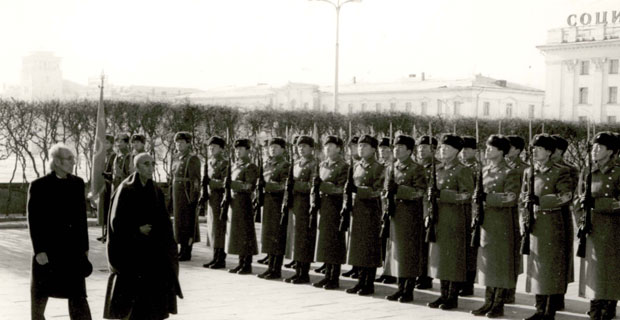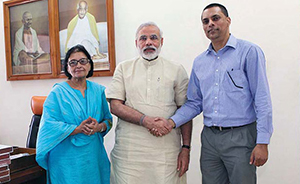“GURU-ENVOY”
Early the 1980s the Mongolian government...
At that time there was no apparent sense of impending crisis. As protocol, the Armed Force of Mongolia presented a guard of honour to salute for Rinpoche, as it did for all new ambassadors. There was a certain irony in the scene: there was a military show of communist army presenting itself as a guard of honour to a Buddhist monk ambassador. In the customary short speech following the ceremony at the presidential palace, Ambassador Kushok Bakula, as if pre-empting the momentous changes that would soon sweep the country, mentioned that ‘’the Lord Buddha, whose teachings spread to the Mongolian steppes in the 13th century was the first Indian envoy to Mongolia’’. Rinpoche spoke these words at a time when there was no freedom of faith, freedom of speech and freedom of association, not to mention of different political thoughts. In Mongolia India is known by the name ‘Jagar’, which affectionately means the saphed (white) or pavitr bhoomi (sacred land), and many people in Mongolia genuinely consider India as their brothers in civilization and Third neighbour.
Shortly thereafter with the disintegration of the USSR and socialist block and fall of the Berlin wall, and the economic liberalization going on in China changes began to sweep through the steppes of Mongolia. Within weeks, popular reform demonstrations started as ordinary and young people in particular started taking to the streets despite early spring windy weather waved throughout Mongolia.
Transformations in Mongolia were peaceful. Not a single bullet was fired, no window pane shattered. The leadership of the country firmly opposed any such move, maintaining strict policy of non use of force and stood for amicable resolution of conflict to bring about smooth transition to democracy. Rinpoche was always held by them in high esteem and relayed the prevailing situation in the country timely and precisely to his government.
At the result of efforts and initiatives by Ambassador Bakula the government of India launched training programme for nurturing national personnel (well known as IETC) in various disciplines highly essential for Mongolian human resource development. Ever since then three decades have elapsed and number of Mongolians trained and studied in India today must have amounted at hundreds if not thousands. India also helped to set up cyber-centers at five provinces to facilitate the delivery of government services in remote areas and empowering local administration, offered soft-loan for constructing a small scale cement plant in Khovd province and workshops for producing traditional medicine.











Comments.